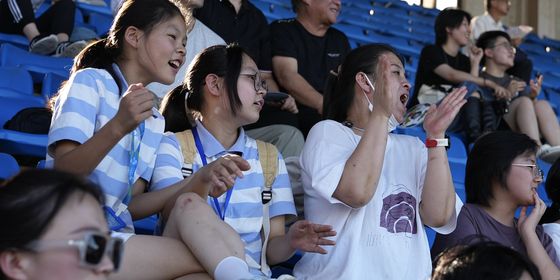New, controversial Chinese dating show makes money from your outrage
If you’re into Chinese variety shows on TV, you must still rememer the popular dating show If You Are the One (非诚勿扰), which was launched in 2010 and became one of the hottest TV programs at the time. The show has contributed the famous quote “I’d rather cry in a BMW than laugh on a bicycle” (spoken by a female contestant), which incurred sharp criticism due to the materialism it glorified.
As more and more eye-catching variety shows hit the screen, If You Are the One was gradually left behind. But as another year’s Spring Festival recently reminded us, Chinese people’s enthusiasm for matchmaking is boundless. At the end of December, 2016, a new dating TV show emerged just in time for this season of family togetherness and marriage guilt-tripping, and it seems to has taken the baton from If You Are the One—at least, in its ability to cause widespread controversy.
This new show is called “中国式相亲”, literally “Chinese-Style Blind Dating,” hosted by the transgender activist Jin Xing. Unlike other dating shows, here it’s the parents, and sometimes other family members, who choose the date for their single child. In its first episode, five single men and their families took part in the show, with the men themselves sitting in a separate room and their parents in the studio. Then, single female contestants come onstage, one at a time. After listening to their self-introduction, the men’s family decided whether their son should date with the girl.
During the process, the men can communicate with their families through a phone, but the final decision was to be made by their family. If more than one family was interested in the girl, it’s the girl’s turn to make a choice—date the son of one of these families, or say “no” to everybody.
Let’s put aside the similarites between the matchmaking model here and the practice of arranged marriage in the past times, the opening of this show is enough to make people feel uncomfortable. Though many people hoped that Jin Xing could make a progressive speech to inspire single people, she just brought up a slogan—“A person casting off singledom brings honor the whole family (一人脱单,全家光荣).” It’s hard to believe such a slogan exists in the 21st century, but after you watch the whole episode, you’ll find that the slogan is absolutely not the weirdest part.
Male contestants and their families come to the stage one by one. The No.1 family, whose son was a kindergarten teacher, expressed their expection for their future daughter-in-law first: be physically heathy, kind-hearted, able to manage househould affairs, and good at housework. The last point was repeatedly highlighted, but okay, it’s standard stuff.
Then the No. 2 family came onstage with the following requirement: A girl who has cold hands and feet was unacceptable. Because, they go on to state, women whose hands and feet are cold can’t give birth to heathly children. And for your information, the mother of this family, who came up with this standard, called herself as a professional dietitian.
After another three demanding but otherwise sane families, the No.6 family came to the stage, the mother referring to their 23-year-old son as a “childish naughty boy.” And the boy’s expection is for his future partner to be “mature and able to look after me well.”
Everything came to a head when the second female contestant showed up. The woman has a good looks and brought some soup she made. All the families showed huge interest in her at first. But, to everyone’s surprise, the woman was 40 years old, divorced, living with a son, and owned a restaurant selling soup. After her self-introduction, everyone lapsed into silence. Then, one male contestant said that “If she was in her twenties, I will definitely choose her.”
The mother of that 23-year-old “boy” the followed: “My son is too young, if you two go out, there will be a generation gap between you.” The dietitian mother pointed her finger, saying “[Her] age is too old [to give birth]; whoever married to our family should give birth to two or three grandchildren for me.” She also said to the female contestant—who, it must be clear, didn’t show interest in her son at all—that “20-year-old men are the goods on order; 30-year-old men are stocked goods; 40-year-old men are limited-stock goods. But as a 40-year-old woman, how can you believe that you can still ‘own’ them ten years later?”
Naturally, these dripping misogynistic comments enraged many netizens, especially females. Soon after this episode was released, many people flamed this show on social media:
“After watching this show you will know why girls don’t want to do blind-dating.”
“Most men’s parents don’t want a daughter-in-law, they just want a housemaid who can give birth to children.”
“It’s just a show selling poisoned values. It’s just depreciating women irresponsibly.”
But all this criticism didn’t affect its popularity. Instead, it now becomes one of the top-rated shows. Actually, in the field of television production, it’s an open secret that the more controversial the program is, the higher the audience rating it. Just search in our mind, you can easily recall some headlines about blatantly flame-baity shows.
A few months earlier, the reality show Dad, Where Are We Going? paired Dong Li, a 23-year-old Olympic athlete and a 4-year-old girl as “fake” father and daughter. The so-called “intern” father took care of the little girl several days a week, ate and slept next to her, and was even present when she bathed. This triggered worry among parents and experts, who think the show may mislead the public (to say the least) about appropriate adult-child relationships and make children vulnerable.
Job-seeking reality show Only You has consistently stirred controversy among netizens since its launch in 2010. People even have called for a boycott of the show, because the host and those interviewers are arrogant, rude and sometimes deliberately humiliate the job-seekers. One job-seeker even passed out on the stage because of the boss’ acerbic remarks.
Wonderful Friends, a reality show produced by Hunan Television featuring celebrities working with animals, was condemned by animal rights groups and netizens for its “cruel” tasks, including forcing elephants to have pedicures and dressing chimps as Superman.
Unfortunately, even though these variety shows have all been criticized, all of them performed well in terms of audience rating. People have already got accustomed to the fact that the popularity of a TV show is not positively related to its quality. So, when they choose a program to watch, many tend to rely on online reviews from actual viewers. To end on a more positive note, here is a list of variety shows recommended netizens on Douban.com, a Chinese review aggregator website.
I Am a Singer (name now changed to The Singers): The Chinese version of the same-named Korean reality show, where seven talented, established singers (as well as some has-beens and former winners of other singing shows) perform for a selected audience, which votes to eliminate one singer after two weeks’ performance. Its first season was broadcast in 2012 and attracted wide attention, but it’s becoming less popular than before.
Informal Talks: A Chinese talk show in which a panel of foreigners living in China hold discussions in Mandarin on various topics and issues. Representatives from different countries create a multicultural atmosphere, and the topics they talk about are usually timely and funny. The only problem is that many people think it is adapted from popular Korean talk show Non-Summit without buying the rights, but Hubei Television claims it’s adapted from another show of their own, The World is Different.
Go Fighting!: This show is classified as a game-variety show, where the MCs and the guests complete missions at a well-known Chinese landmark to meet a specific objective. The challenges vary with each episode, and the rules are not strictly enforced, resulting in a less scripted feel.
Qipa Talk: It’s an informal debate show that involves no professional debaters. Participants are from all walks of life, including cross-talk comedians, playwrights, TV hosts, news reporters, and college professors.
Top Funny Comedian: It’s a weekly show where ten groups of comedians compete against each other. Every week, each group put on a performance and a winner is picked. Every two episodes, the group ranked last will be knocked out.
If you are interested, feel free to have a look. But TWOC is not responsible for their actual quality.
Cover Image from wuhunews.cn












